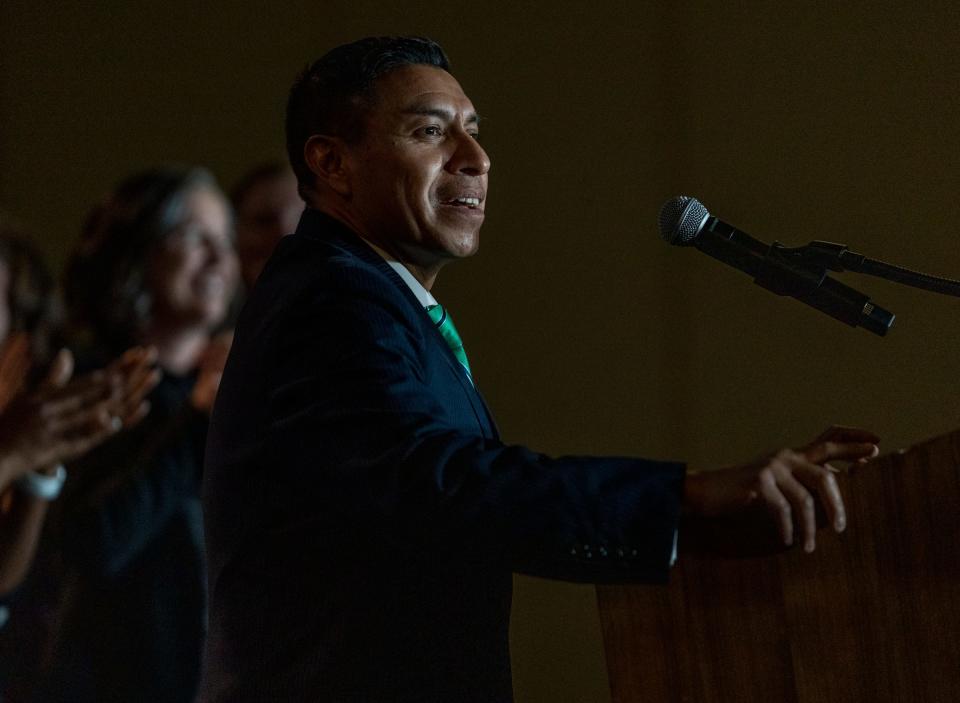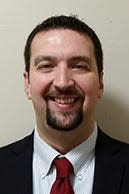Op/Ed: Indiana has a 'democracy problem' that voters have a responsibility to fix
- Oops!Something went wrong.Please try again later.
After avoiding the forecasted red wave, President Joe Biden said that Election Day was a “good day, I think, for democracy.” While that may be the case nationally, Indiana’s 2022 voter turnout ranked 46th out of 50 states. Democratic candidate for Secretary of State Destiny Wells frequently commented that “Indiana isn’t a red state, it’s a purple state with a voter turnout problem.” Sadly, it seems that Indiana is just a state with a democracy problem.
Heading into the recent election, polls suggested that a majority of Americans are concerned about a democratic crisis. More than 60% of Americans believe that U.S. democracy is “in crisis and at risk of failing.” A New York Times/Siena College poll found that 71% of Americans believe that American democracy is “currently under threat,” yet only 7% identified it as the most important problem facing the country.
Indiana was one of the 11 states which nominated a major party candidate to administer the state’s elections who refused to accept the outcome of the 2020 election as fair and legitimate. They were, of course, all Republicans. Yet “democracy voters” appear to have turned out to vote to repudiate election deniers. Secretary of State candidates were named one of this election’s “biggest losers.” In eight of those states, including our neighboring state of Michigan, voters rejected the election denier. Not so here in Indiana.

First, the Indiana Republican Party chose to nominate Diego Morales instead of the sitting Republican incumbent Holli Sullivan at their 2020 convention. The Republican Party chose to nominate Morales, a flawed candidate accused of among other things:
Embellishing his resume during his failed 2018 Congressional campaign
Being disciplined and fired while a staff member of the Secretary of State’s office
Sexually assaulting two women previously involved in Republican politics
Overselling his military career and refusing to clarify it during the campaign
Using more than $40,000 in campaign funds to purchase a car
Refusing to participate in debates or public forums
Potentially committing voter fraud
Beyond a rap sheet that would disqualify most candidates, Morales also attempted to walk back comments denying the 2020 presidential election calling it a “scam.” Likewise, he has proposed and attempted to walk back cutting early voting period in Indiana in half.
More:Republican Diego Morales wins Indiana secretary of state race
In what appeared to be the most competitive state race heading into the November election, Morales won in a landslide — winning by almost 15%. While Morales underperformed other statewide Republican candidates, that such a flawed, unqualified candidate peddling election conspiracies was able to win so easily ought to give us pause as a state. Now that he has won, the Indiana Republican Party has to “Diego proof” the Secretary of State’s office so the damage he can inflict on the office and Indiana voters can be minimized.
With outcomes like this, it is no surprise that voter turnout in Indiana is generally one of the lowest in the country. Indiana is not a state that historically values and promotes democratic citizenship. For example, Indiana has one of the strictest photo identification requirements in the country, is tied for closing their polling places earlier than all other states, and requires voters to register further away from the election than most states. According to the 2022 Cost of Voting Index, Indiana ranks 36th out of all 50 states based on how difficult it is for Hoosiers to cast a ballot. Unfortunately, this is one of the more generous or optimistic assessments of the quality democracy here in the Hoosier state. Other measures that incorporate concepts like gerrymandering and election administration such as the State Democracy Index rank Indiana 42nd or the Electoral Integrity Project, which is led by researchers at Harvard University, have Indiana tied for 45th out of 50.

If the quality of democracy is going to improve in Indiana, it must start with us the voters. Promoting civic education is a good start, but electing leaders that might undermine our elections is a step backward. In spite of the hurdles elected officials put in front of us or how uncompetitive our elections might appear to be, it will not change if Indiana voters do not act.
Dr. Gregory Shufeldt is an associate professor of political science at the University of Indianapolis and a Public Voices Fellow with The OpEd Project.
This article originally appeared on Indianapolis Star: Hoosier voters are key to improving 'quality of democracy' in Indiana

